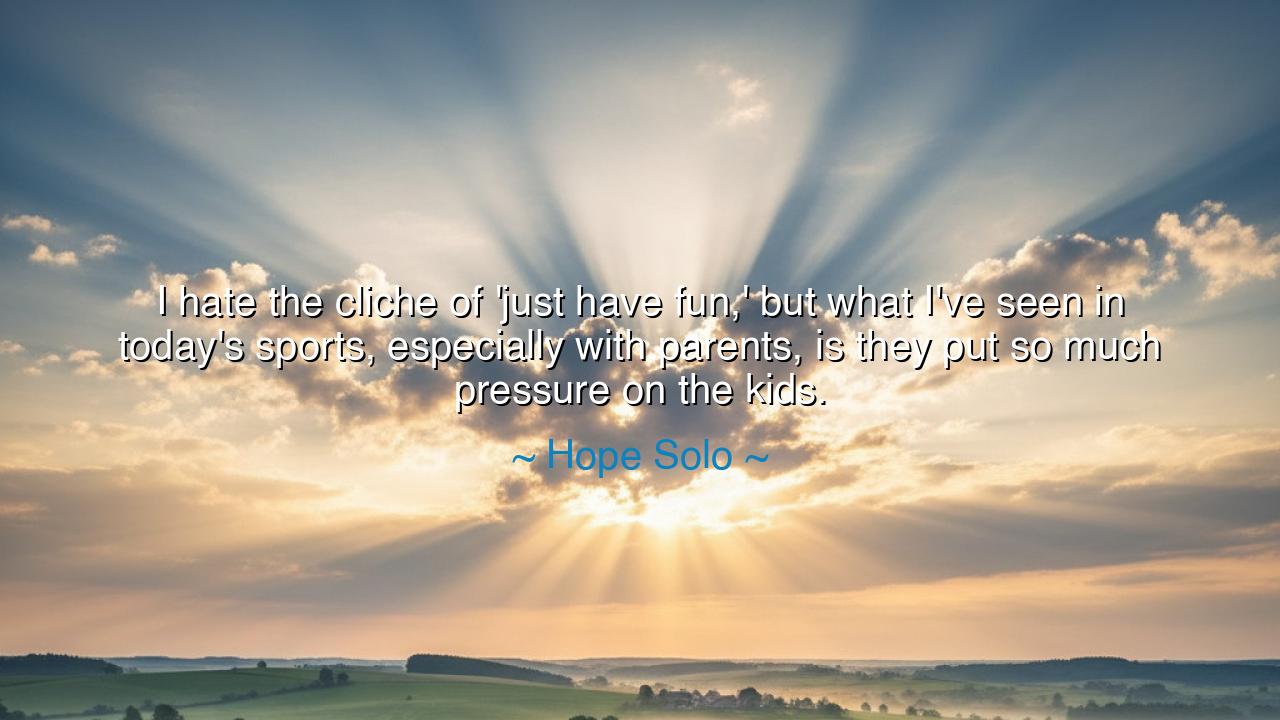
I hate the cliche of 'just have fun,' but what I've seen in
I hate the cliche of 'just have fun,' but what I've seen in today's sports, especially with parents, is they put so much pressure on the kids.






The words of Hope Solo, “I hate the cliché of ‘just have fun,’ but what I’ve seen in today’s sports, especially with parents, is they put so much pressure on the kids,” cut to the heart of one of the greatest paradoxes in youth athletics. On one hand, sport is meant to be a source of joy, freedom, and growth. On the other, it has become for many children a burden, weighed down by the crushing expectations of parents who see their children’s success as their own triumph. Solo’s words are not only about sports—they are about the fragile spirit of childhood, and the danger of forcing it to bend beneath the weight of adult ambition.
The origin of this thought lies in Solo’s own journey as a goalkeeper, who from a young age was forged in the fires of competition. She knows what it means to dedicate oneself fully, to strive for greatness, and to bear the expectations of both family and nation. Yet she also sees clearly the damage when the joy of play is stripped away by relentless pressure. Her distaste for the empty phrase “just have fun” comes from knowing that fun is not given by words, but by freedom. True fun arises when a child plays for the love of the game, not for the approval of parents in the stands.
This truth has been echoed throughout history. In ancient Sparta, children were raised with discipline from the earliest age, their lives devoted entirely to preparing for war. Though it produced fearsome warriors, it also robbed them of the freedom of childhood. Contrast this with the athletes of Olympia, who trained fiercely but competed in games that were also celebrations of the body, the gods, and the spirit of humanity. One path bred soldiers; the other inspired joy. Solo’s words call us to remember the latter: sport as a festival of spirit, not a battlefield of parental pride.
We may also recall the story of Andre Agassi, the tennis champion, who wrote of how his father pushed him with unrelenting pressure, building a machine to fire balls at him for hours each day. Though Agassi achieved greatness, he confessed that he hated tennis for much of his career, because the game was never his choice, but his father’s demand. His story illustrates with painful clarity the very truth Solo warns against: that when a parent’s pressure eclipses a child’s joy, the cost may be the child’s spirit, even if the victories are many.
The lesson is this: to nurture true greatness in children, we must protect their joy. Pressure can sharpen, but it can also break. Encouragement can guide, but domination can suffocate. A child’s love for the game must be their own, not a reflection of their parents’ hunger. Solo’s words remind us that the phrase “just have fun” is hollow when shouted over expectations—but when children are given space to truly play, without fear of disappointing others, then joy, discipline, and even greatness may blossom together.
Practically, this means parents, coaches, and mentors must step back and allow children to own their journey. Support them, yes. Teach them, yes. But let them play, let them fall, let them discover both the sweetness of victory and the lessons of defeat on their own terms. Instead of asking, “Did you win?” ask, “Did you love what you did today?” Instead of demanding perfection, celebrate effort, courage, and growth. In doing so, we guard the flame of passion, rather than smother it beneath the ashes of pressure.
So, beloved listener, take Hope Solo’s words to heart: do not let the weight of adult ambition rob children of the simple joy of play. Protect their freedom. Guide their discipline. Let them fall in love with their game on their own terms. For in this balance lies the making not only of champions, but of whole, joyful human beings. And a child who loves the game will carry that love farther than a child who plays only to silence their parent’s demand.






AAdministratorAdministrator
Welcome, honored guests. Please leave a comment, we will respond soon